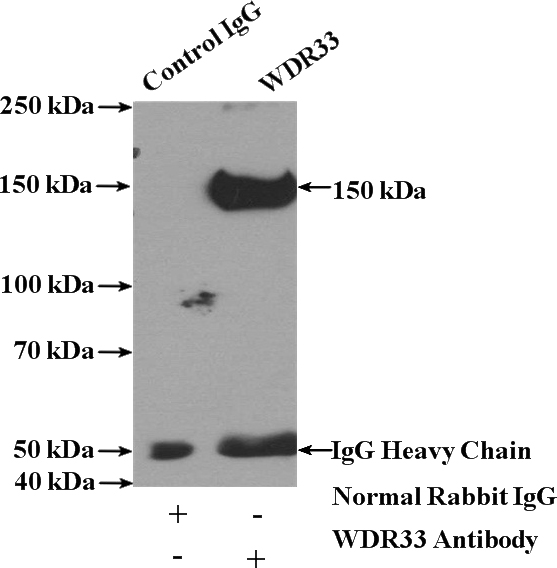-
Product Name
WDR33 antibody
- Documents
-
Description
WDR33 Rabbit Polyclonal antibody. Positive WB detected in HepG2 cells, HeLa cells. Positive IP detected in HeLa cells. Observed molecular weight by Western-blot: 170 kDa
-
Tested applications
ELISA, WB, IP
-
Species reactivity
Human; other species not tested.
-
Alternative names
FLJ11294 antibody; NET14 antibody; WD repeat domain 33 antibody; WDC146 antibody; WDR33 antibody
-
Isotype
Rabbit IgG
-
Preparation
This antibody was obtained by immunization of WDR33 recombinant protein (Accession Number: BC010283). Purification method: Antigen Affinity purified.
-
Clonality
Polyclonal
-
Formulation
PBS with 0.02% sodium azide and 50% glycerol pH 7.3.
-
Storage instructions
Store at -20℃. DO NOT ALIQUOT
-
Applications
Recommended Dilution:
WB: 1:500-1:5000
IP: 1:500-1:5000
-
Validations

HepG2 cells were subjected to SDS PAGE followed by western blot with Catalog No:116863(WDR33 Antibody) at dilution of 1:1000

IP Result of anti-WDR33 (IP:Catalog No:116863, 4ug; Detection:Catalog No:116863 1:1000) with HeLa cells lysate 3200ug.
-
Background
WD repeat domain 33 (WDR33), also named WDC146, is a member of the WD repeat protein family. WD repeats are minimally conserved regions of approximately 40 amino acids typically bracketed by gly-his and trp-asp (GH-WD), which may facilitate formation of heterotrimeric or multiprotein complexes. Members of this family are involved in a variety of cellular processes, including cell cycle progression, signal transduction, apoptosis, and gene regulation. This gene is highly expressed in testis and the protein is localized to the nucleus. This gene may play important roles in the mechanisms of cytodifferentiation and/or DNA recombination.This gene encodes a member of the WD repeat protein family. WD repeats are minimally conserved regions of approximately 40 amino acids typically bracketed by gly-his and trp-asp (GH-WD), which may facilitate formation of heterotrimeric or multiprotein complexes. Members of this family are involved in a variety of cellular processes, including cell cycle progression, signal transduction, apoptosis, and gene regulation. This gene is highly expressed in testis and the protein is localized to the nucleus. This gene may play important roles in the mechanisms of cytodifferentiation and/or DNA recombination. Multiple alternatively spliced transcript variants encoding distinct isoforms have been found for this gene. This antibody recognizes the full length WDR33 protein.
Related Products / Services
Please note: All products are "FOR RESEARCH USE ONLY AND ARE NOT INTENDED FOR DIAGNOSTIC OR THERAPEUTIC USE"
